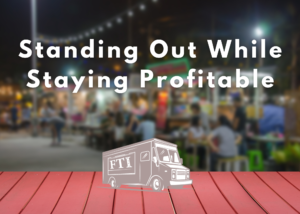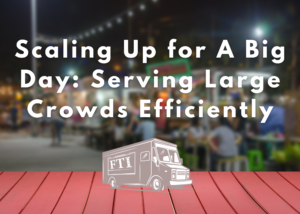
Standing Out While Staying Profitable
Striking the balance between serving profitable crowd pleasers and standing out from the crowd is what sets a moderately successful food truck from a very

However, like any business, starting a food truck requires careful planning and a clear understanding of the financial commitment involved. In this blog post, we’ll delve into the various costs associated with starting a food truck, providing you with a comprehensive guide to budgeting for your mobile culinary dream.
1. Initial Investment Costs
Food Truck Purchase:
The largest initial expense is typically the purchase of the food truck itself. The cost of a food truck can vary significantly depending on whether you buy a new, custom-built truck or a used one. Here’s a breakdown of the potential costs:
• New Custom-Built Food Truck: $75,000 – $150,000
• Used Food Truck: $30,000 – $125,000
• Retrofit an Existing Vehicle: $10,000 – $50,000
When buying a new truck, you have the advantage of customizing it to your specific needs, which can enhance efficiency and functionality. However, used trucks can be a cost-effective option, though they may require modifications and repairs.
Truck Wrap and Branding:
Your food truck’s exterior is your mobile billboard. A professionally designed wrap that reflects your brand can attract customers and create a memorable impression. Costs for a high-quality truck wrap typically range from $2,500 to $5,000.
2. Licenses and Permits
Operating a food truck requires various licenses and permits, which can vary by location. It’s crucial to research and budget for these costs early on:
• Business License: $50 – $500 annually
• Food Truck Permit: $250 – $1,000 annually
• Health Department Permit: $50 – $1,000 annually (including inspections)
• Fire Department Permit: $100 – $500 annually
• Parking Permit: $50 – $500 annually
In addition to these, you may need special event permits if you plan to operate at festivals, fairs, or other large gatherings.
3. Kitchen Equipment
A food truck requires commercial-grade kitchen equipment to ensure you can prepare and serve food safely and efficiently. The cost of kitchen equipment can vary based on your menu and cooking methods, but here’s a general estimate of essential items:
• Cooking Equipment: $5,000 – $20,000 (grills, fryers, ovens, etc.)
• Refrigeration Units: $1,500 – $5,000
• Food Preparation Surfaces: $500 – $2,000
• Serving Equipment: $500 – $2,000
• Sanitation Supplies: $500 – $1,500
If you buy a used truck, it might come with some equipment, which can reduce your initial investment.
4. Initial Inventory and Supplies
Stocking your food truck with initial inventory and supplies is another significant expense. This includes ingredients, disposable containers, utensils, and cleaning supplies. The cost will depend on your menu and the scale of your operations, but here are some general estimates:
• Initial Food Inventory: $1,000 – $3,000
• Disposable Containers and Utensils: $500 – $1,500
• Cleaning Supplies: $200 – $500
5. Marketing and Branding
Effective marketing is essential to attract customers and build a loyal following. Initial marketing expenses might include:
• Logo and Branding Design: $500 – $2,500
• Website Development: $500 – $5,000
• Social Media Advertising: $100 – $500 monthly
• Print Materials (menus, flyers, business cards): $200 – $1,000
6. Operational Costs
Operational costs include the day-to-day expenses of running your food truck. It’s important to budget for these ongoing costs to ensure smooth operations:
• Fuel: $300 – $1,000 monthly (depending on travel distance)
• Maintenance and Repairs: $500 – $1,500 annually
• Insurance: $1,500 – $4,000 annually
• Commissary Fees: $300 – $1,200 monthly (if required by local regulations)
7. Staffing Costs
If you plan to hire employees, consider the costs of wages, training, and benefits:
• Wages: $10 – $20 per hour (depending on location and experience)
• Training Costs: $500 – $1,500
• Uniforms and Miscellaneous Supplies: $200 – $500
8. Point of Sale (POS) System
Investing in a reliable Point of Sale (POS) system is crucial for efficient operations. A good POS system helps manage sales, track inventory, and process payments. Costs for a POS system can vary:
• Hardware and Setup: $300 – $2,000
• Software Subscription: $50 – $200 monthly
9. Unexpected Costs
It’s wise to set aside a contingency fund for unexpected expenses. These can include emergency repairs, additional permits, or unforeseen market changes. A good rule of thumb is to allocate 10-20% of your total budget for contingencies.
Total Estimated Costs
Now that we’ve covered the various expenses, let’s summarize the total estimated costs for starting a food truck. Keep in mind that these are general estimates and can vary based on location, scale, and specific requirements.
Low-End Estimate:
• Food Truck Purchase: $50,000
• Truck Wrap and Branding: $2,500
• Licenses and Permits: $1,000
• Kitchen Equipment: $10,000
• Initial Inventory and Supplies: $2,000
• Marketing and Branding: $1,500
• Operational Costs: $10,000 annually
• Staffing Costs: $10,000 annually
• POS System: $1,000
• Contingency Fund: $5,000
Total Low-End Estimate: $93,000
High-End Estimate:
• Food Truck Purchase: $150,000
• Truck Wrap and Branding: $5,000
• Licenses and Permits: $3,000
• Kitchen Equipment: $20,000
• Initial Inventory and Supplies: $5,000
• Marketing and Branding: $5,000
• Operational Costs: $20,000 annually
• Staffing Costs: $20,000 annually
• POS System: $2,000
• Contingency Fund: $10,000
Total High-End Estimate: $240,000
Funding Your Food Truck
Once you’ve estimated the costs, the next step is securing funding. Here are some common funding options for starting a food truck:
• Personal Savings: Using your own savings can be a straightforward way to fund your business without incurring debt.
• Small Business Loans: Many banks and credit unions offer loans specifically for small businesses. Prepare a solid business plan to improve your chances of approval.
• Investors: Seek investment from family, friends, or angel investors who believe in your concept.
• Crowdfunding: Platforms like Kickstarter and Indiegogo allow you to raise funds from a large number of people in exchange for rewards or equity.
• Grants: Look for grants specifically targeted at small businesses or food entrepreneurs. These can provide funds without the need for repayment.
Tips for Cost Management
Managing costs effectively is crucial for the success of your food truck. Here are some tips to help you stay within budget:
• Start Small: Begin with a limited menu and expand as you gain more customers and experience.
• Negotiate with Suppliers: Establish good relationships with suppliers and negotiate prices for bulk purchases.
• Monitor Expenses: Keep track of all expenses and regularly review your budget to identify areas for cost savings.
• Leverage Social Media: Use social media for marketing instead of expensive traditional advertising.
• Collaborate: Partner with other food trucks or local businesses for joint events and promotions to reduce marketing costs.
Conclusion
Starting a food truck is a significant financial commitment, but with careful planning and budgeting, it can be a rewarding and profitable venture. By understanding the various costs involved and exploring funding options, you can turn your culinary dreams into a successful mobile business. Remember, the key to success is not just great food, but also efficient operations, effective marketing, and excellent customer service. With passion and perseverance, you can navigate the challenges and enjoy the freedom and satisfaction of running your own food truck.

Striking the balance between serving profitable crowd pleasers and standing out from the crowd is what sets a moderately successful food truck from a very

In the ever-evolving world of food service, operators are increasingly looking for creative ways to increase revenue, utilize underused kitchen space, and adapt to shifting

Food trucks are an entrenched part of the culinary landscape, offering an array of delicious and unique dishes to food lovers in all sorts of

Running a food truck can be a dream come true for many people. The idea of serving delicious food to the public, having the freedom